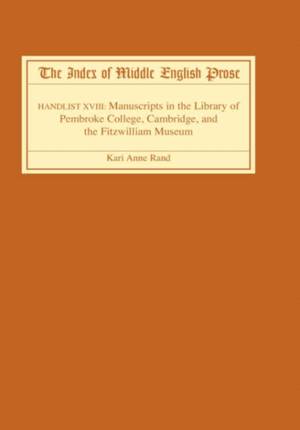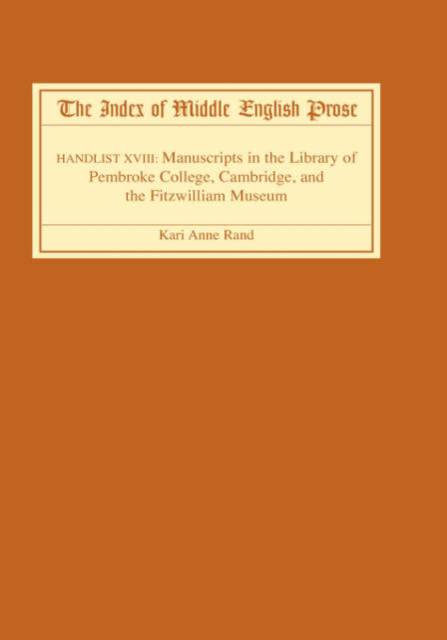
- Afhalen na 1 uur in een winkel met voorraad
- Gratis thuislevering in België vanaf € 30
- Ruim aanbod met 7 miljoen producten
- Afhalen na 1 uur in een winkel met voorraad
- Gratis thuislevering in België vanaf € 30
- Ruim aanbod met 7 miljoen producten
Zoeken
The Index of Middle English Prose
Handlist XVIII: Manuscripts in the Library of Pembroke College, Cambridge, and the Fitzwilliam Museum
Kari Anne Rand
€ 177,45
+ 354 punten
Omschrijving
`The Index of Middle English Prose when completed will be a monumental achievement' REVIEW OF ENGLISH STUDIES Two very different collections are surveyed in this volume. The manuscripts of Pembroke College, Cambridge are typical of a medieval foundation. Its core of books is a working library of that period, representing the interests andneeds of its Fellows, very often given or bequeathed by them to the College. The collection was substantially enlarged in 1599 through the gift by William Smart of Ipswich of a large number of manuscripts which until the Reformation had belonged to the Abbey of Bury St Edmunds. By contrast the emphasis of the Fitzwilliam Museum collection is to a great extent art historical. At its heart are the manuscripts bequeathed by Lord Fitzwilliam in 1816. These were supplemented throughout the 19th century by a series of gifts and bequests, culminating in 1904 in the largest bequest to date, from Frank McClean, of some 203 manuscripts.
In spite of the different character of the two collections, both contain a range of Middle English prose items, among them Chaucer's Boece, a complete Wycliffite sermon cycle and several Paston letters [all from Pembroke], the Anlaby Cartulary, the "Canutus" pestilence tract, the Brut, Lydgate's Serpent of Division and Nicholas Love's Mirror of the Blessed Life of Jesus Christ (from the Fitzwilliam). KARI ANNE RAND is Professor of Older English Literature at the University of Oslo.
In spite of the different character of the two collections, both contain a range of Middle English prose items, among them Chaucer's Boece, a complete Wycliffite sermon cycle and several Paston letters [all from Pembroke], the Anlaby Cartulary, the "Canutus" pestilence tract, the Brut, Lydgate's Serpent of Division and Nicholas Love's Mirror of the Blessed Life of Jesus Christ (from the Fitzwilliam). KARI ANNE RAND is Professor of Older English Literature at the University of Oslo.
Specificaties
Betrokkenen
- Auteur(s):
- Uitgeverij:
Inhoud
- Aantal bladzijden:
- 160
- Taal:
- Engels
- Reeks:
- Reeksnummer:
- nr. 18
Eigenschappen
- Productcode (EAN):
- 9781843840534
- Verschijningsdatum:
- 16/02/2006
- Uitvoering:
- Hardcover
- Formaat:
- Genaaid
- Afmetingen:
- 176 mm x 251 mm
- Gewicht:
- 462 g

Alleen bij Standaard Boekhandel
+ 354 punten op je klantenkaart van Standaard Boekhandel
Beoordelingen
We publiceren alleen reviews die voldoen aan de voorwaarden voor reviews. Bekijk onze voorwaarden voor reviews.











